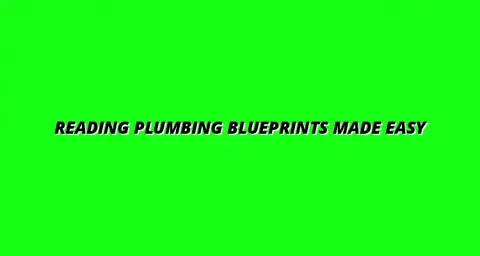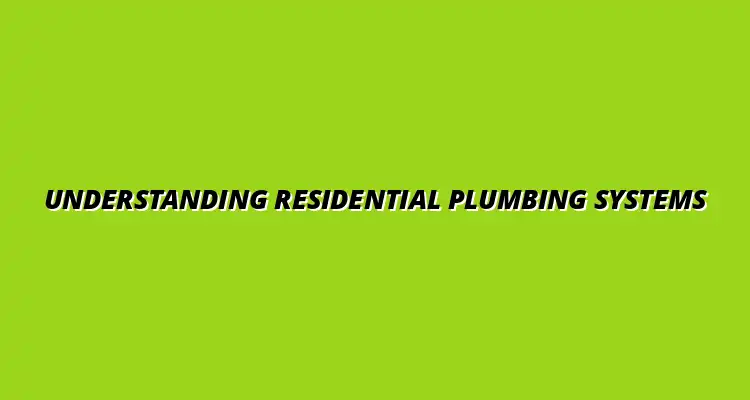
- Plumbing Basics
- Dec 31
2024-12-24
Plumbing is essential for any household. It involves a network of pipes, fixtures, and fittings that provide water supply and remove waste from homes. Understanding how these systems work can prevent headaches down the road and make you feel more confident in managing your home's plumbing.
In my experience at Plumb Pro Care, I’ve seen many homeowners overlook their plumbing systems until problems arise. Being proactive about understanding these systems can save time and money and improve your home’s overall functionality.
A residential plumbing system is made up of two main components: the water supply system and the drainage system. The water supply system brings fresh water into the home, while the drainage system carries wastewater out. These systems work together seamlessly to ensure comfort and hygiene in our daily lives.
It’s essential to recognize that plumbing isn't just about pipes and faucets. It also includes appliances like dishwashers and washing machines, which rely on plumbing to function properly. Without these systems, our homes would be far less convenient!
By understanding these components, homeowners can make informed decisions about repairs and upgrades. Proper knowledge about these parts can lead to better maintenance and fewer plumbing emergencies!
Plumbing systems are vital for everyday activities like bathing, cooking, and cleaning. For instance, imagine trying to wash dishes without running water or flushing a toilet! A well-functioning plumbing system is crucial for maintaining comfort and hygiene in our homes.
Moreover, efficient plumbing can also improve water conservation. When systems are properly maintained, less water is wasted, which is beneficial for both the environment and your wallet!
Being aware of these common issues not only helps in identifying problems quickly but also aids in timely interventions. At Plumb Pro Care, we often advise homeowners to keep an eye on their plumbing to avoid costly repairs later!
Water supply lines are critical for bringing clean water into your home. They are typically made of materials like copper, PVC, or PEX. Each material has its own advantages and disadvantages, so it's essential to choose wisely.
For instance, PEX is flexible and easy to install, while copper is durable and resistant to corrosion. Understanding the materials can help you make better choices during installation or upgrades!
Monitoring water pressure ensures that all fixtures deliver water effectively. If you notice fluctuations, it might be time to consult a professional plumber from Plumb Pro Care!
The drainage system is responsible for removing wastewater from your home. It's crucial for maintaining a healthy living environment. Proper drainage prevents water from pooling in unwanted areas and helps avoid structural damage!
Understanding how drainage works can help in identifying potential problems. For example, recognizing the signs of a clogged drain early can save significant hassle later on.
Recognizing these issues can help homeowners take action before they escalate. When in doubt, don’t hesitate to reach out to your trusted plumbing service like Plumb Pro Care!
Plumbing issues can often feel overwhelming, but understanding the common problems can help alleviate some of that stress. In residential settings, homeowners frequently encounter plumbing complaints that can disrupt their daily lives. From leaky faucets to clogged drains, it's essential to identify these issues early on to prevent further damage to your home.
Common complaints include issues such as dripping taps, slow-draining sinks, and overflowing toilets. These problems can arise from various causes like worn-out washers, buildup of debris, or even improper installation. Recognizing the specific symptoms will help you decide on the best course of action, whether it's a quick DIY fix or calling in a professional.
When it comes to plumbing troubles, knowing whether to attempt a DIY solution or seek professional assistance is crucial. Minor issues like a clogged sink might be handled with a plunger or a drain snake. However, more significant problems—such as persistent leaks—should definitely involve a qualified plumber.
Another aspect to consider is the safety of your plumbing system. If you're unsure about a problem or feel out of your depth, it's always best to err on the side of caution. At Plumb Pro Care, we pride ourselves on providing expert help when you need it most, ensuring your plumbing is safe and effective.
Upgrading your plumbing system can significantly enhance your home's efficiency and overall function. If you notice frequent issues, it may be time to consider a complete plumbing overhaul. Many homeowners find that installing modern fixtures and pipes not only solves problems but also improves water efficiency.
The benefits of modern plumbing technology include better water flow, reduced leaks, and lower utility bills. Investing in quality materials during upgrades can help you avoid costly repairs in the future. Working with professionals like those at Plumb Pro Care can ensure that you make informed decisions about your plumbing needs.
Finding the right professional plumbing services is crucial for maintaining your home’s plumbing system. With so many options available, it can be challenging to know where to start. Look for plumbers with good reviews, experience, and proper licensing to ensure you’re getting quality service.
Knowing what to look for can make a significant difference. When I needed plumbing help, I emphasized hiring someone who had good communication skills alongside technical expertise. It’s essential to find someone who makes you feel comfortable and confident in their abilities!
Hiring a qualified plumber involves understanding the certifications and licenses that ensure top-notch service. Different regions may have varying requirements, so it's essential to familiarize yourself with local regulations. This knowledge can save you time and stress in the long run.
As a homeowner, it’s also wise to have a go-to plumber for emergency situations. Knowing whom to call can provide peace of mind when unexpected problems arise. At Plumb Pro Care, we focus on building long-term relationships with our clients, ensuring that your plumbing needs are met promptly and efficiently.
Being proactive with your plumbing knowledge can empower you to address issues as they arise. There are plenty of books and guides available that provide valuable insights into plumbing maintenance. These resources can help you understand your system better and highlight important maintenance practices.
Online tutorials and video resources have also become incredibly helpful for DIY enthusiasts. They offer step-by-step guidance on common repairs, making it easier for homeowners to tackle minor issues without professional help. Just remember, safety first—if you ever feel unsure, don’t hesitate to call a pro!
Understanding your plumbing system is essential for maintaining its functionality. Regular maintenance and awareness of plumbing issues can save you time and money. Homeowners should always prioritize proactive measures to prevent major plumbing emergencies.
Encouraging safe plumbing practices is key! Whether it’s being mindful of what goes down your drains or scheduling regular inspections, these small efforts can lead to significant benefits. We're here to support you with all your plumbing needs at Plumb Pro Care!
